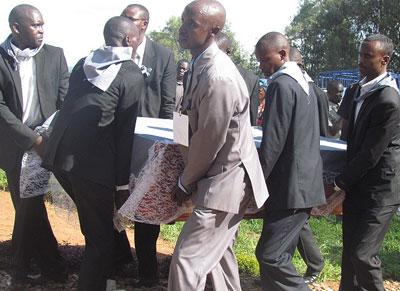TWENTY YEARS after the 1994 Genocide against the Tutsi, in which over a million people were killed, Rwandans have once again been urged to reveal the whereabouts of the victims yet to be offered a decent burial.


TWENTY YEARS after the 1994 Genocide against the Tutsi, in which over a million people were killed, Rwandans have once again been urged to reveal the whereabouts of the victims yet to be offered a decent burial.
Hundreds of residents in Huye District gathered on Monday to pay respects to thousands of Genocide victims buried at Kinazi memorial site.
The day was also an occasion to offer a decent burial to remains of an estimated 759 victims. The remains were recently exhumed from various places in Rusatira and Kinazi sectors.
A requiem mass was held for the victims before the caskets containing the bodies were taken for a final rest inside the memorial centre.
During the mass, Fr Emmanuel Twagirayezu preached love and unity and called on Genocide perpetrators to continue repenting and seeking forgiveness from the ones they offended.
He also called on Rwandans to make efforts to fight evil and promote good deeds.
Mourners also heard testimonies, songs and other messages which narrated the killings in the current Rusatira and Kinazi sectors.
Speaking at the event, Huye mayor Eugene Kayiranga Muzuka told mourners that it is disappointing to see that 20 years later, some bodies of those killed during the Genocide are still missing.
Muzuka told residents that "having information on the victims’ whereabouts doesn’t necessarily mean you killed them” and pleaded with all those who have information about their whereabouts to reveal them so as to give them a chance to be offered a decent burial.
He told residents that commemorating the Genocide is not only an occasion to pay respect to those who were killed, but also salute the courage of those who stopped the Genocide and condemn those who prepared and executed the Genocide as well as those who continue to harbour genocide ideology.
"Good leaders champion better living conditions, teach residents to live together, love and respect each other,” Muzuka said. "But the genocidal government preached hatred and discrimination.We should condemn them while also drawing lessons from that chapter of our history.”
Mayor Muzuka urged residents to draw lessons from the country’s reconstruction chapter, citing achievements in various sectors, including infrastructure, social welfare, economic growth and infrastructure development, among others.
"Those achievements were a result of the good policies that were promoted after the Genocide,” he said.
MP Jacqueline Mukakanyamugenge called on the residents to remain united if they are to continue building a better nation.
Noting that everyone has a responsibility of safeguarding the country’s achievements, Mukakanyamugenge urged survivors to keep up efforts geared at improving their livelihoods.


